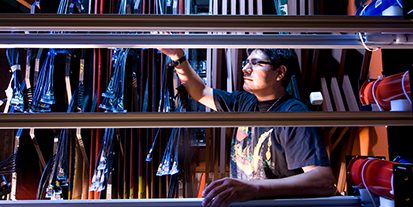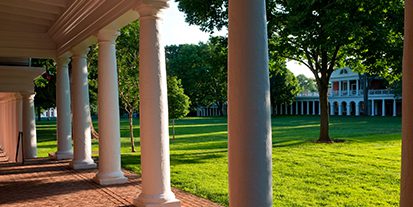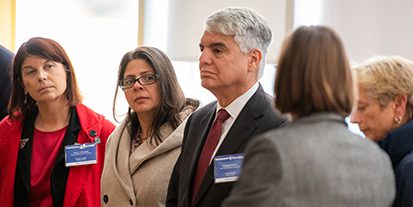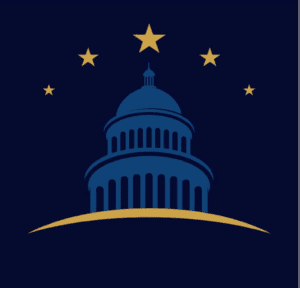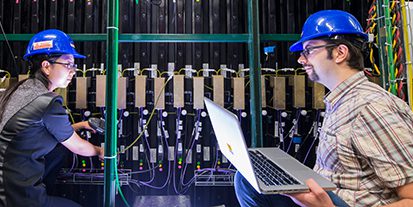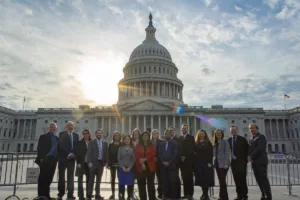URA Early Career Award
Nominations for URA Early Career Award Now Closed
Awardee to be Announced at Annual Fermilab Users Meeting June 2024Overview
The URA Early Career Award is one of the honorary awards conferred annually by the Universities Research Association (URA) for outstanding work conducted by young researchers at Fermilab or in collaboration with Fermilab scientists that benefits Fermilab scientific program in the areas of cosmology/particle astrophysics and high energy physics.
The URA Early Career Award is presented at the June Fermilab Users Meeting.
The awardee will receive $10,000 from URA and present their work at the Users Meeting.
Eligibility
All Ph.D. researchers at either Fermilab or URA member institution who are within 6 years of their initial appointment to a tenure track position (or a Fermilab tenure track equivalent*) as of the nomination deadline. Career breaks and time spent on family or medical leave will not be counted as part of the six-year period. The work for which the award is made must directly benefit a Fermilab experiment or accelerator project or be performed in conjunction with Fermilab staff. The work may be experimental, theoretical, or a contribution to instrumentation, computing, or accelerator technologies.
*At Fermilab, ‘tenure track equivalent’ positions are Associate Scientist and the Wilson and Peoples Fellowships.
Nomination Materials
1) Name and title of nominator. Candidates may nominate themselves for the Award. If not self-nominating, nominator should provide one of the letters of support.
2) Nominee’s CV, including invited talks. The CV must also show the initial tenure track position and year of appointment if different from the current position. If career breaks have been taken, please explicitly state the time periods. Please do not submit personally identifiable information such as birthdate or social security number.
3) List of publications.
4) List of outreach, mentoring, and community engagement activities.
5) Up to three letters of support from scientists or faculty familiar with the work.
Letters should provide sufficient background such that the significance of the candidate’s work can be understood by all members of the committee, including those who are not experts in the subfield of the candidate. The reference letters are submitted online by the reference writers at the submission site below. Candidates need to include both references on their standard coversheet and instruct the system to email the letter request notifications to their references. The reference writer cannot log in or submit the letter without such email notification.
6) Candidate’s statement describing research work and demonstrating scientific insight and creativity, 5 pages max.
7) Statement, by either the nominator or the candidate, 250 words max, highlighting the candidate’s work benefits to the laboratory.
For questions, please contact the Early Career Award Committee chair, Cecilia Gerber, at uraearlycareer@fnal.gov.
Nominations must be submitted to https://academicjobsonline.org/ajo/jobs/27002 by Friday, April 5, 2024. All nomination material should be sent in electronic form, .pdf preferably.
Call for Nominations
The call for nominations will be issued on January 22 by the Award Committee Chair, FNAL CRO, and URA.
Notification Process
By May 6th, the Early Career Award Committee chair will inform URA and the Fermilab Director/Chief Research Officer (CRO) of the selected awardee and will subsequently inform the award recipient.
Early Career Award Committee
The URA Early Career Award Committee members reflect a sufficiently diverse representation of disciplines and expertise to ensure eligible nominees’ appropriate and fair consideration. The members and chair of the award committee are appointed by the Fermilab Director/CRO.
| Name | Role | Organization |
| Cecilia Gerber | Chair | University of Illinois Chicago |
| Pedro Machado | Co-Chair | Fermilab |
| Juan Estrada | Member | Fermilab |
| Lindsey Gray | Member | Fermilab |
| Elisabeth Krause | Member | University of Arizona |
| Stoyan Stoynev | Member | Fermilab |

